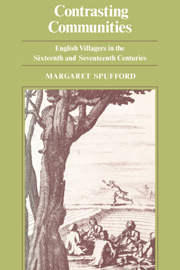Book contents
- Frontmatter
- Contents
- List of maps and graphs
- List of tables
- List of abbreviations
- Acknowledgements
- Dedication
- Introduction
- Map 1 Cambridgeshire: natural boundaries and soil types
- Map 2 Cambridgeshire: county and parish boundaries
- PART 1 People, Families and Land
- PART 2 The Schooling of the Peasantry
- PART 3 Parishioners and their Religion
- 9 Dissent before and after the commonwealth
- 10 A general view of the laity in the diocese of Ely
- 11 Fragmentation and the growth of sects
- 12 The possible determinants of dissent
- 13 The reality of religion for the villager
- Conclusion
- Appendix 1 The Butlers of Orwell
- Appendix 2 Notes on Graphs 3 and 5
- Index of Contemporary Names
- General Index
13 - The reality of religion for the villager
Published online by Cambridge University Press: 25 January 2010
- Frontmatter
- Contents
- List of maps and graphs
- List of tables
- List of abbreviations
- Acknowledgements
- Dedication
- Introduction
- Map 1 Cambridgeshire: natural boundaries and soil types
- Map 2 Cambridgeshire: county and parish boundaries
- PART 1 People, Families and Land
- PART 2 The Schooling of the Peasantry
- PART 3 Parishioners and their Religion
- 9 Dissent before and after the commonwealth
- 10 A general view of the laity in the diocese of Ely
- 11 Fragmentation and the growth of sects
- 12 The possible determinants of dissent
- 13 The reality of religion for the villager
- Conclusion
- Appendix 1 The Butlers of Orwell
- Appendix 2 Notes on Graphs 3 and 5
- Index of Contemporary Names
- General Index
Summary
Much has been said of the areas in which dissent gained a footing amongst the laity, its strength, and the time when it may have gained this strength. Little has been said, so far, of the much more important matter of its quality. It is just here of course that the attempt, which is perhaps ludicrous enough anyway, to gauge the opinions and devotional life of the ordinary villager is most likely to break down, for the ordinary villager is not an articulate man. It is just here, also, that the attempt is most important, for if we have no idea of the importance that these people's beliefs had to them, the numerical counting of heads is a sterile exercise at best. But there is a certain amount of evidence which does bear on the faith of the laity. It has one very important limitation. Very little can ever be said of the way that the beliefs of the orthodox amongst the laity affected them. Orthodoxy, like happiness, has no history. We can scarcely say anything of the overwhelming mass of parishioners who went on going to their parish churches, whatever the changes in liturgy and belief imposed on them. Amongst them were presumably some who went, not solely because worship was required of them by ecclesiastical law, but because they had a meaningful faith. But this faith has no history. Perhaps we can catch an echo of its existence from time to time.
- Type
- Chapter
- Information
- Contrasting CommunitiesEnglish Villages in the Sixteenth and Seventeenth Centuries, pp. 319 - 350Publisher: Cambridge University PressPrint publication year: 1974



